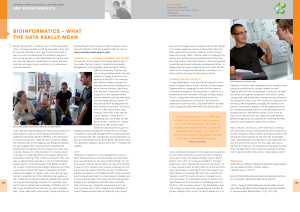Welcome to the NGFN Microarray Data Analysis Resource
![]()
The NGFN Microarray Data Analysis Resource aims to improve the bioinformatics and statistics support for the design and analysis of gene expression data in the NGFN (German National Genome Research Network).
Courses in Practical Microarray Analysis: Basic techniques will be taught in regularly held courses focussing on the practical side of gene expression data analysis.
Workshops on Good Statistical Practice: The start of the NGFN's second phase motivates to incite the discussion on guidelines and best practices for clinicians and biologists who work with microarrays. The discussion will focus on two major activities in microarray studies:
- From the genomic signature to a clinical profile;
- From a gene list to biological function.

For more advanced and project specific bioinformatics problems the contributing bioinformatics groups are open for collaborations with biological and clinical research groups in the NGFN.

The NGFN Microarray Data Analysis Resource is funded by

Contact:
• Ulrich Mansmann, University of Munich.
• Rainer Spang, Max-Planck-Institute for Molecular Genetics, Berlin.
• Tim Beissbarth, German Cancer Research Center (DKFZ), Heidelberg.
• Benedikt Brors, German Cancer Research Center (DKFZ), Heidelberg.
• Wolfgang Huber, European Bioinformatics Institute, Hinxton, UK
• Jörg Rahnenführer, Max-Plack-Institute for Informatics, Saarbrücken.
• Axel Benner, German Cancer Research Center (DKFZ), Heidelberg.


